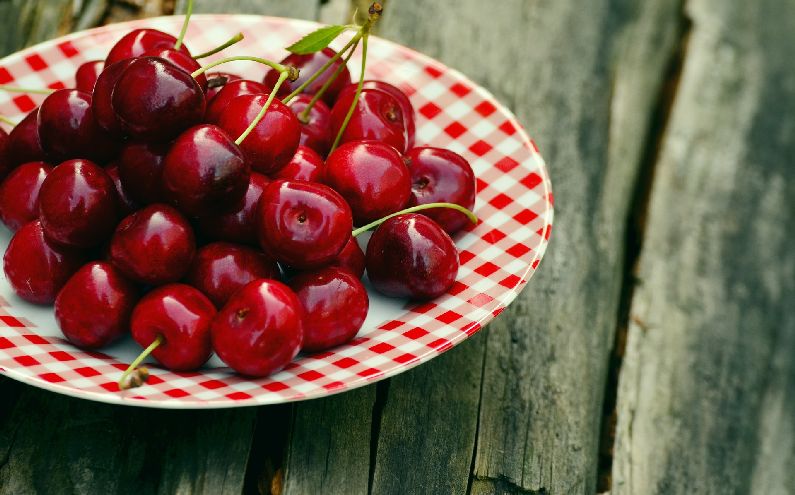Today more than ever, people across the country are growing their own fruit. There are many reasons for this, and we applaud the effort!
Nature Hills growers deliver backyard orchards with commercial orchard-grade, vigorous fruit trees and bushes. Our fruit trees produce fruit for cooking, baking, or fresh eating straight from the tree.
There is nothing like reaching out and picking fruit from your very own plant. And one of the coolest things is that we offer a wide mix on the site.
You’ll see beloved modern cultivars like ‘Honeycrisp Apple’ (yes, the kind you see on grocery store shelves). But you’ll also get a chance to try the more unusual heirloom varieties, like the astounding ‘Mutsu Apple’ which are individually wrapped by hand in Japan to protect the delicious crop, before being baked into a meal fit for an Emperor.
The Growing Edible Landscape Trend
Explore the rewards of growing fruit at home, but don’t limit your focus to a dedicated fruit orchard with trees lined up in neat rows. Instead, expand your vision of how fruiting plants work in your garden design.
Why not add fruiting plants or vegetables to your existing landscaping? The Edible Landscape is a design concept growing in appreciation.
Top 5 Benefits of Homegrown Fruit
- You get to grow your favorite full-flavored varieties and pick them at peak ripeness
- You’ll know exactly what chemicals are being used to grow your fruit before your share with your family and friends
- You’ll feel prepared for winter by canning or preserving your fruits to enjoy through the year
- You’ll gain a sense of accomplishment by growing your own produce in your garden
- You’ll enjoy planning, planting and working your own Edible Landscape and get some healthy exercise
Edible Garden Design Tips

Fruit tree varieties including Apples, Peaches, Pears, Plums, Lemons, Oranges and many others will reward you with delicious fresh produce every year. While the health benefits of homegrown fruit can’t be understated, the ornamental value added to the landscape shouldn’t be underestimated, either.
For best quality, plant your fruit trees where they’ll get at least 8 hours of direct sunlight a day. Morning sun is best.
For varieties that require cross-pollination, select two or three overlap their bloom and ripening seasons. Site them correctly in the landscape and enjoy fruit that ripen at different times to extend the season of fruit.
The ornamental qualities of fruit trees have been vastly underused. Design fruit trees and fruit producing bush varieties into your landscape as you would any tree or shrub.
Shop by Variety for easy access to the following plants
- Cherries and Pears can and should be pruned to a balanced formal shape making them outstanding flowering accent trees.
- Apricots are nature’s fruiting shade trees, even in marginal Apricot regions, a well selected variety will provide great shade and fruit.
- Pluots and Apriums carrying the Apricot gene provide this same advantage in any landscape where Apricots can be grown.
- Picture a hedge row of Blueberries or Citrus providing a border or screening out an unwanted view, while also providing an extended harvest of fruit selected by ripening time.
- Naturalize Peach or Nectarine with other plants in the landscape. You’ll love the beautiful displays of flowers in the spring, followed by a bountiful harvest come summer.
- Persimmons incredible orange fall color is remarkable.
- The look of a well-established Olive is an age-old classic.
- Figs have a bold beauty and give two generous crops of fruit in a single season.
- Plums and Apples are the most adaptable of all fruit trees and the easiest to grow. Plums and Apples both have a wonderful range of flavors, colors and sizes.
Make Fruit Plants Work in Your Landscape Design
We understand that placing fruit trees and bush fruit varieties into today’s smaller lot sizes can be a challenge. That’s why we recommend learning easy pruning tricks for size control to grow just about any plant. New dwarf materials are also an important element for success.
Apartment dwellers would be surprised how many plants you can grow on a balcony. Blueberry and Citrus are both ideal for container growing. Citrus makes a beautiful container plant and then is conveniently moved to a protected location for the winter time. Blueberries need low pH soil and water are often better off being grown in a container where you can more easily manage growing conditions.
Many towns also offer Community Gardens where you can rent a plot to work. Contact your local Ag Extension office to get ideas for your community.
Come together with friends, churches and neighbors to create a shared garden space. You could have a great time working together, and everyone could share in the bounty.
You can’t compare the taste of store bought produce from the grocery store. Commercial growers offer varieties that are specifically grown to withstand long-distance shipping with your very own homegrown fruit. Grow your own fruit for the health benefits, or to simply experience one of the joys of nature and get a little physical activity in the sunshine.
For organic soil amendments, fertilizers and pest control options, check out our curated Home & Garden collection. These solutions make backyard gardening a lot easier and more… fruitful.


